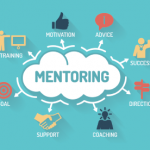He recommended “having specific, explicit discussions with [your mentees] about the fact that we are multi-dimensional beings, that the spirit is critical and that they need to find a way to express that spirit within the context of their work life.”
9. Generosity: Mentors, he said, should be generous in spirit, generous with resources and generous with time.
“There are moments in which it’s time for the grant to go in, and there are things that people didn’t think about until the last minute. And it’s like, ‘Really?’ But you don’t have any option. You have to be generous with your time, because they need it,” he said.
10. Be their rock: One of the most painful experiences is knowing the world isn’t perfect, Dr. Rosen said. Mentees will fail.
“Those are the circumstances in which mentees reach out, and they reach out to the rock,” he said. “And the role of the rock is to be firm and steadfast in the face of whatever it is that’s coming at them.”
Dr. Rosen discussed his experience with a mentee who he’d advised frequently and was often been bothered by small things. Years later, the mentee told him that—eventually—all they had to do was text Dr. Rosen or dial his number. Dr. Rosen didn’t have to respond or pick up. But how was that helpful?
The mentee said, “I hear your advice in my head.”
Thomas R. Collins is a freelance writer living in South Florida.



